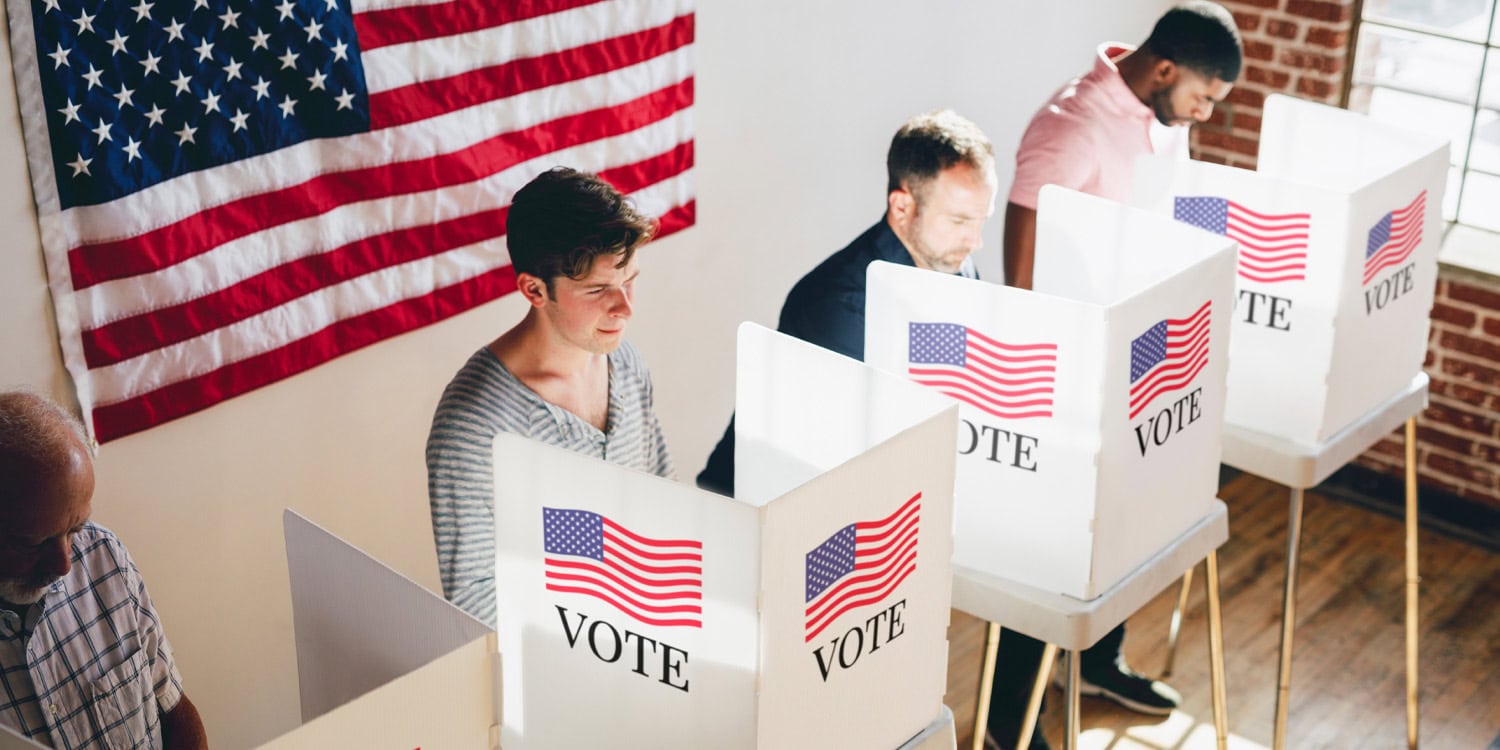People experiencing symptoms of depression may be less likely to vote strictly along party lines, according to new research published in the journal Political Psychology. The study found that as depressive symptoms increased, the influence of a voter’s usual party loyalty on their vote choice decreased. This suggests that individuals with higher levels of depressive symptoms might base their voting decisions on factors beyond their long-held political preferences.
Political scientists have long observed that many voters tend to consistently support the same party, following well-established habits and loyalties. Traditionally, strong attachment to a political party has been seen as a reliable predictor of voting behavior. However, researchers began to wonder whether a person’s emotional state might influence this connection.
While previous studies have examined whether depression affects voter turnout, the new study aimed to understand how depression might alter the choices voters make. Psychological research indicates that depression can change the way people process information, potentially leading to more careful and less automatic thinking. The researchers hypothesized that this shift in thinking style could weaken the link between a person’s party loyalty and their actual vote.
“We were interested in understanding how symptoms of depression play out in voter decision making,” said study author Luca Bernardi, an associate professor of politics at the University of Liverpool. “On the one hand, some literature on depression explores the benefits of depressed mood, especially when depression is mild. This literature finds evidence that depressed mood, much like a sad mood, encourages more analytic and careful information processing.”
“On the other hand, political psychologists have shown that anxiety, as an emotion related to political issues, can facilitate more effortful cognition and encourage citizens to rely less on habitual voting patterns. However, no research has tested these ideas with depression.”
To investigate this, the researchers analyzed data from surveys conducted in three European countries: Britain, Spain, and the Netherlands. The British data came from an online survey conducted in May and June of 2022 with over 1,400 participants. The Spanish data originated from an online survey carried out in October 2018, involving more than 3,000 participants. For the Netherlands, the researchers utilized the Dutch Longitudinal Internet Studies for the Social Sciences—a long-term panel survey. They used ten waves of data collected annually from 2011 to 2021, with an average of nearly 6,600 participants per wave. These surveys were designed to be representative of the national populations in each country, employing quotas based on age, gender, education, and region to ensure that the samples reflected the broader population.
In each survey, participants were asked questions designed to measure several key factors. First, to determine vote choice consistency, participants were asked which political party they felt closest to and which party they intended to vote for if an election were held soon. The researchers then created a measure of “defection,” indicating whether a person’s intended vote was inconsistent with their stated party affiliation.
Second, to measure the strength of partisanship, participants rated how close they felt to their preferred party on scales ranging from “not at all close” to “very close.” Finally, to assess depressive symptoms, the surveys employed established mental health scales. The British survey used the nine-item Center for Epidemiologic Studies Depression Scale, which asks about feelings of depression, sadness, and energy levels. The Spanish and Dutch surveys used similar scales that included items related to depressive symptoms such as feeling down, sad, or lacking energy.
In addition to these core measures, the surveys also collected demographic information—such as age, gender, and education—as well as data on political interest, which served as control variables in the analysis.
After analyzing the data, the researchers found a consistent pattern across all three countries. They observed that for individuals with lower levels of depressive symptoms, a stronger attachment to a political party was associated with a higher likelihood of voting for that party. In other words, strong partisans with few depressive symptoms tended to vote along party lines.
However, as the level of depressive symptoms increased, this relationship weakened. For individuals with higher levels of depressive symptoms, the strength of their party attachment had less impact on their vote choice. Statistically, the interaction between partisanship strength and depressive symptoms was significant, indicating that depressive symptoms moderate the effect of partisanship on voting decisions.
“The Normal Vote Model posits that in normal circumstances citizens vote according to their partisan attachments,” Bernardi told PsyPost. “However, that model did not consider the role played by negative affect. In particular, as Affective Intelligence Theory suggested: (1) experiencing anxiety about the in-party candidate should trigger individuals to become more vigilant and to base their judgments on more relevant and diagnostic information; (2) the end result of such a process is that anxious voters are more likely to defect from their party when voting, particularly when they perceive their parties’ candidate to endorse policies incongruent with their own (Redlawsk and Pierce 2017, pp. 417-418). Therefore, under Affective Intelligence Theory, anxiety is conceived as an emotion and its origin is external (i.e. associated to political candidates or parties).”
“The key message of our paper is that when depression is mild, it may trigger the same kind of effect we have seen with anxiety as an emotional reaction,” Bernardi explained. “More precisely, we find that the association between the strength of party attachment and the consistency between the party you identify with and the party you actually vote for is moderated by symptoms of depression. In other words, depression encourages defection from your party when voting, but this effect is statistically significant only at mild levels of depression. If so, the origin of depression need not be solely external, as Affective Intelligence Theory would suggest.”
“When survey questionnaires used to detect depression in the general population ask people how they have been feeling in recent weeks, they do not reference politics,” Bernardi continued. “This doesn’t mean that politics cannot be a vulnerability for mental health. In other research, we have found evidence that feeling stressed because of politics increases symptoms of depression. However, our findings suggest that partisan defection may also be driven by one’s internal circumstances.”
To illustrate the size of this effect, the researchers noted that in Britain, the predicted probability of voting against one’s party preference differed by 23 percentage points between those with low and moderate levels of depressive symptoms. In Spain, this difference was about 8 percentage points. These findings suggest that the influence of party loyalty on vote choice is not fixed, but can diminish when individuals experience symptoms of depression.
The results imply that when people experience symptoms of depression, their usual political preferences may become less of a driving force in their voting decisions. Instead of voting solely based on ingrained party loyalty, these individuals may engage in a more thoughtful, less automatic decision-making process. This idea aligns with the concept of depressive realism in psychology, which posits that in some situations, individuals experiencing depression may perceive reality more accurately—or at least with fewer of the optimistic biases that most people exhibit. In the context of voting, this could mean that someone with depressive symptoms is less likely to follow party lines blindly.
“Depressed mood might confer benefits to thinking and decision making, perhaps due to successful adaptation under certain circumstances, as psychologist Jon Rottenberg would argue,” Bernardi explained. “In this respect, depressive symptoms may act as an alternative mechanism leading to partisan defection, and in future research we want to explore this possibility further.”
“The majority of research focuses on the negative implications of depression. Our paper speaks to the minority of studies that examine the potential benefits of depressed mood. In that light, it is not surprising to see that similar ideas are emerging in other fields, including politics.”
Importantly, the researchers investigated whether anxiety could account for their findings by including measures of anxious feelings in their analysis. They discovered that even after controlling for anxiety, the influence of depressive symptoms on voting behavior remained significant. This result indicates that depression plays an independent role in shaping how individuals vote.
However, as with all research, there are limitations. One important consideration is that the study relied on self-reported information. Participants were asked to rate their own feelings and political preferences, meaning that the results depend on how accurately individuals can report their internal states. Responses may be influenced by a desire to present oneself in a certain light or by other personal biases. Similarly, the instruments used to measure depression are based on self-perceptions rather than clinical diagnoses. While these surveys can identify depressive symptoms, they do not capture the full complexity of a clinical condition.
The study also did not explore in depth why depression might lead to less reliance on habitual political choices. While the researchers propose that more thoughtful processing could be one explanation, other factors—such as reduced confidence in one’s political judgments—might also play a role. Future work will need to investigate these underlying reasons in greater detail.
“In the future, we want to study the effect of depression on political information processing more directly,” Bernardi said. “We also want to determine whether our findings can be replicated among individuals with general anxiety disorder.”
The study, “Not in the mood for party: Symptoms of depression reduce the weight of partisanship on vote choice,” was authored by Luca Bernardi, Guillem Rico, and Eva Anduiza.




